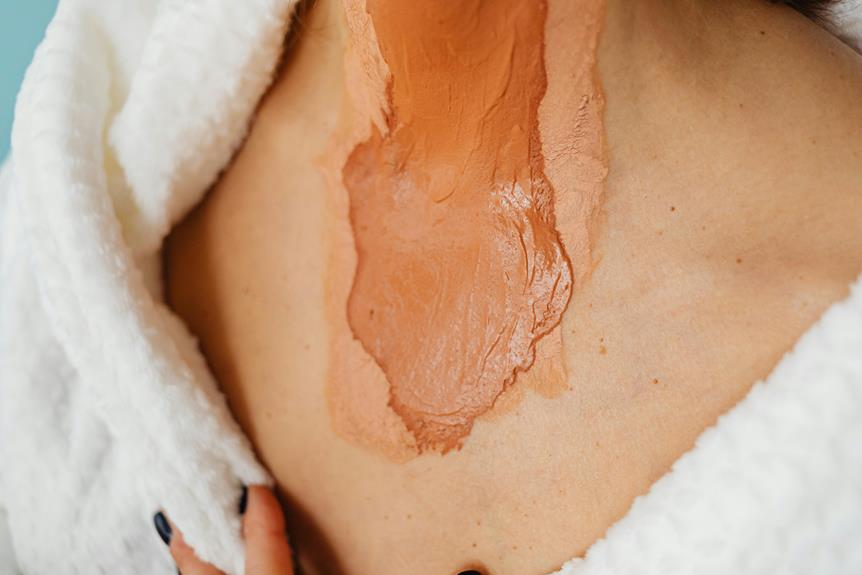
To choose the right foundation shade for your skin tone, hold a white paper near your face in natural light to understand your undertone—pink, red, or blue for cool tones, yellow, peach, or golden for warm, and a mix for neutral. Identify your skin type—oily, dry, combination, or normal. Test shades in natural light by stepping outside for accurate results, and consult with beauty experts to guide you towards a suitable shade. Remember to adjust foundation shades for seasonal changes, darkening in summer and lightening in winter, allowing for a customized blend that enhances your natural beauty.
Understanding Your Skin Undertone
To determine your skin undertone, hold a white piece of paper near your face in natural light to observe the subtle hues reflected onto your skin. Look closely at the colors that appear. If you notice more pink, red, or blue tones, you likely have a cool undertone. In contrast, if you see more yellow, peach, or golden hues, your undertone is likely warm. For those with a mix of both warm and cool hues, you may have a neutral undertone.
Understanding your skin undertone is crucial when selecting the right foundation shade. Choosing a foundation that matches your undertone will ensure a seamless and natural look. For cool undertones, opt for foundations with pink or rosy undertones. If you have warm undertones, foundations with yellow or golden undertones will complement your skin best. Those with neutral undertones have the flexibility to choose foundations that lean slightly warm or cool, depending on personal preference. By identifying your skin undertone, you can confidently choose the perfect foundation shade for a flawless finish.
Identifying Your Skin Type
When considering the right foundation shade for your skin tone, it's important to first identify your skin type. Understanding your skin type is crucial as it helps you choose a foundation that not only matches your skin tone but also works well with your skin's unique characteristics. There are generally four main skin types: oily, dry, combination, and normal.
To identify your skin type, pay attention to how your skin feels throughout the day. Oily skin tends to look shiny and may be prone to acne, while dry skin can feel tight and flaky. Combination skin has areas that are both oily and dry, usually an oily T-zone and dry cheeks. Normal skin is well-balanced, neither too oily nor too dry.
Knowing your skin type will guide you in selecting the right foundation formula. For example, if you have oily skin, you might prefer a matte or oil-free foundation, while those with dry skin may lean towards hydrating or dewy foundations. By understanding your skin type, you can narrow down your options and find a foundation that not only matches your skin tone but also complements your skin's needs.
Testing Foundation Shades in Natural Light
For the most accurate representation of how a foundation shade will look on your skin, step outside and test it in natural light. Natural light provides the truest reflection of how a foundation will blend with your skin tone.
Indoors, artificial lighting can alter the appearance of colors, making it challenging to find the perfect match. When you step outside, observe how the foundation looks on your skin in different areas – jawline, cheeks, and forehead. The natural light will help you see if the shade matches your skin tone seamlessly or if it appears too light or too dark.
Take a mirror with you to assess the foundation in various angles and intensities of sunlight. Move into shaded areas and under direct sunlight to see how the shade adapts. Remember that your skin may have different undertones in various parts, so it's essential to check the match in different areas.
Consulting With Beauty Experts
Step outside and test the foundation shade in natural light, then consider consulting with beauty experts to further refine your choice. Beauty experts have a trained eye for matching foundation shades to various skin tones and can provide valuable insights that you may not have considered. They can assess your undertones, skin type, and any specific concerns you may have, guiding you towards the most suitable foundation shade for your unique complexion.
By consulting with a beauty expert, you can benefit from their expertise and experience in selecting the perfect foundation that complements your skin tone flawlessly. Additionally, beauty experts can recommend specific brands or products that align with your preferences and skincare needs. Their advice can help you navigate the wide range of foundation options available on the market, ensuring that you find a shade that not only matches your skin tone but also enhances your natural beauty.
Consulting with beauty experts can be a valuable step in your journey to finding the right foundation shade for your skin tone.
Adjusting Foundation Shades for Seasonal Changes
Consider adjusting your foundation shade to adapt to seasonal changes in your skin tone. As the seasons shift, so does your skin tone. In the summer, your skin may become a shade or two darker due to increased sun exposure. During the winter, it might lighten up as you spend more time indoors and receive less sunlight. To ensure your foundation always matches your skin perfectly, you may need to switch shades throughout the year.
When transitioning from summer to winter, you might find that your current foundation appears too dark or too light. In this case, you can mix different shades to create a customized blend that matches your changing skin tone. For example, mix a darker summer foundation with a lighter winter foundation to achieve the perfect shade for the transitional periods.




